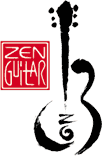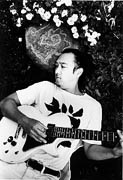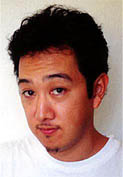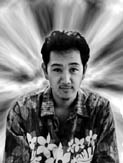Interview with Fearlessbooks.com
August 22, 2001
Interviewed conducted via email by D. Patrick Miller, publisher,
Fearless Books, Berkeley, Calif.
In
Zen 24/7 you write, "Zen says, don't wait until the
car accident, the cancer diagnosis, or the death of a loved
one to get your priorities straight." Has your own diagnosis
of cancer changed your priorities, apart from the obvious new
priority of treatment?
Not
really. Ever since I got married and started having kids,
my wife
and children have been the focus of my life. That hasn't
changed. It's true, my number one priority now is getting healthy,
but it's as much for them as for myself. I certainly appreciated
my good health when I had it. In my first real job out of college,
I worked as a journalist and sat next to this crusty old veteran
who was nearing retirement. He used to tell me every day, "If
you've got your health, you've got your wealth." Repeated
it like a mantra. As someone whose father died too early at
age 54, I took that message to heart. I never wanted to take
good health for granted.
The
other aspect to that quote you cited is the idea of taking
action
now rather than later. One of the best lessons I ever
got was from a college economics professor. He came into class
one day all teary eyed and said his father had just died. He
proceeded to reminisce for a few minutes before getting too
choked up, and then dismissed the class because, "When
something like this happens, all those graphs about supply
and demand don't mean shit." And then he said, "When
you get a chance, you tell your dad that you love him. You
never know." Such a simple message, and yet given the
emotion of the moment, it really stayed with me. I was raised
in a household with a traditional Japanese reserve. In our
family, we never verbalized our love for each other; it was
felt, but always unstated. Growing up, I don't think I ever
said the words "I love you" to anyone. So over Christmas
break I went home and tried hard to find an occasion to say
that to my dad. Having never done it before, I didn't realize
how hard it would be, to actually say "I love you" with
a sincere and open heart. Finally, at the end of the break,
as I was leaving for the airport, I turned to him and said
I loved him. And his eyes welled up with tears.
That
was the last time I saw my dad alive, and those words--"I
love you"--were the last words I ever spoke to him. Before
the school year was over, he had died from a stroke. To this
day, I thank God for that lesson from my economics teacher.
That's why I say in Zen 24/7, don't wait until it's too late
to say what needs to be said, to do what needs to be done.
Every day counts--even plain old today. You never know.
I've
heard the Zen story of an enlightened master who was chronically
ill; when a student asked him how he could be enlightened
yet stay sick, he answered, "I am sick as long as all
men are sick." Is there an impersonal or universal aspect
to your experience of cancer?
I certainly don't feel like a martyr or anything. If there's
a universal aspect to my experience, it's in seeing that everyone
has some kind of pain in their life they're trying to work
through, and while it may not be life-threatening, it still
consumes them. I've got friends who'd really like to get married
and haven't been able to; some who've gone through painful
divorces; some who've been trying for years to conceive a baby
and suffered through numerous miscarriages; some who are just
struggling to make ends meet. Who am I to complain when I've
got a wonderful wife, three beautiful children, and a measure
of financial security? I feel incredibly lucky. There are people
who could live a thousand years and never know the joys I've
gotten to know.
Someone
said to me recently, "You must have a lot of
anger over your illness." And the truth is, I don't. From
the beginning, I never asked, "Why me?" I think I
had enough perspective to say, Why not me? Why anyone? The
first time I went to the cancer center for treatment, I couldn't
believe how many people were in the waiting room. The room
was full of patients in various stages of illness, from elderly
people in wheelchairs down to a young woman half my age. I
remember trying to make appointments for various doctors and
tests and being told I couldn't get in as early as I had hoped.
My first impulse was to say, "You don't understand, this
is a matter of life and death!" But how could I when that
was the case for everyone in the room?
Are
there certain challenges, like cancer, to which the Zen response
is to forget all about Zen? In other words, is one
allowed to "freak out" about such a diagnosis? Many
people may regard Zen as a detached or controlled response
to life; how would you describe your response to learning about
your cancer?
I didn't freak out, but on the way home, I did shed some tears.
When the doctor told me I had cancer, I didn't forget about
zen; on the contrary, my thoughts were filled with zen teachings
about accepting the inevitability of death and regarding each
moment as precious. Those resonated with me more than ever.
After
calling my wife, I did get teary-eyed, however, because I
thought
about the anguish she and my children would have
to go through. (One thing about those zen masters up in the
mountains, they never have a wife and children to worry about.)
But even through the tears, I didn't feel far from zen. There's
a zen story I read somewhere about the funeral of a young monk.
During the funeral, the monk's master begins to weep. Afterwards,
another monk approaches the master and says something like, "You've
always taught that we shouldn't become attached to our bodies
or this life. So why were you crying?"
The
master says, "If not now, when?" In other words,
there are times where it's entirely appropriate to cry--even
as we're cognizant of the need to accept death.
How did each of the topics you took on in your series of books
teach you something new about Zen? How is Zen Guitar different
from Zen Sex, and how are they the same? Have you thought about
writing a book on zen illness?
With each of my books, I learned something new simply by returning
to the same subject and doing more thinking about it (or meditating
on it). The depth of zen is never ending. For example, there
were certain zen koans whose meaning eluded me in the early
books that, with subsequent books, I felt like I understood
better and could write about. (There are plenty more I'm still
mulling over.)
The approach I've taken to writing about zen is somewhat indirect,
but I feel it's the best way to make zen understandable and
applicable to modern readers. I use the principles of zen to
teach about, for example, guitar playing, but at the same time
I use the principles of guitar playing to teach about zen.
So I give the reader two points of entry. If you're interested
in music, computers, or sex (anyone not on that list?), you
can gain new insights into your passion. And if you're interested
in zen philosphy, you can learn how to apply it in your musical,
work, or love life. All of my books are the same in that dual
approach. On a zen level, they contain similar teachings. Where
they differ is in how I choose to illustrate the zen principles.
I like to say that I wrote Zen Guitar from my heart, Zen Computer
from my head, and Zen Sex from my body. What I'm trying to
show is that there are myriad points of entry to zen understanding.
That's the gist of Zen 24/7: That anything, be it an alarm
clock, a window shade, a handshake, or a cup of coffee, can
offer a zen lesson.
A
lot of people have suggested that I take notes for a book
about
zen and cancer, but so far I haven't felt the urge. My
main creative focus during this process has been on making
music, charting my own course of music therapy. I've been bringing
my laptop computer with me to chemo and recording musical compositions
while the chemo's being administered. I'm calling it "The
Chemo Sessions." Some of it sounds really strange. But
it's the probably the best document of what's going on with
me right now.
Are there any books that have helped you through this process?
I've
mainly been returning to my favorite works in Eastern philosophy.
I haven't read any books related to cancer specifically,
other than the wonderful booklet, Fuck You, Cancer, by Rick
Fields, who writes from an Eastern philosophy perspective.
My wife loved the cancer memoir by Evan Handler, Time On Fire
(Owl Books), because she said it was both funny and angry.
She identified more with Handler's blunt approach than with
the "feel-good, uplifting" stories about cancer out
there. My kids seem to like The Paper Chain (Health Press,
Santa Fe, N.M.), by Claire Blake, Eliza Blanchard, and Kathy
Parkinson. It's a gentle way of helping kids understand what
a parent goes through during cancer. They've asked me to read
it to them many times.
The
book I've got by my bedside right now is Hagakure: The Book
of
the Samurai (Kodansha), by Yamamoto Tsunetomo. It formed
the basis for the recent Jim Jaramusch movie "Ghost Dog" (recommended
viewing) and basically speaks to the need for a resolute acceptance
of death. It's a good book for building mental strength. The
book I carry in my bag is The Book of Five Rings by Miyamoto
Musashi, Japan's most legendary samurai. It's a classic treatise
on strategy and swordsmanship, but of course, everything in
the book has broader life meaning. I like the Bantam version
translated by Nihon Services Corp., which in my view is the
best translation among the five or so available.
The
noted writer and cancer specialist Rachel Naomi Remen tells
the
story of a woman who came to her and confessed that
she "wasn't getting the message" of her cancer. Remen
replied, "That's easy. The message of your cancer is that
it wants to kill you." Does your cancer have a message?
Do you see it as an enemy, a teacher, an accident of fate,
or something else?
I don't look at my cancer as the enemy; it's of me, a part
of me. In zen, all is one. I see the cancer more in yin-yang
terms--as a spot of black within the white. It's part of the
duality of life. There is health and there is illness; one
would not exist without the other. All things yin and yang
are in constant flux. Right now, that spot of black is threatening
to grow and overtake the white. Should that happen, it will
be part of the natural ebb and flow of yin and yang.
Which is not to say that I'm resigned to my fate or I don't
want to live. In yin-yang thinking there are always circles
within and without. I'll engage the yin of cancer in a dance
with the yang of chemotherapy. I'll cut the cancer out because
less of me is more of me. And I'll do my damnedest to transcend
the situation, whatever it may be, rather than succumb to it.
To
be honest, I don't feel like I'm dying. I've heard with terminal
illnesses
that, at a certain point, the body begins
a trajectory of death that's unstoppable and leads inexorably
to the end. At this point, I don't feel like I'm on that trajectory.
I know my condition is deadly serious; I don't for a moment
underestimate what cancer is, what it does, and how relentless
it can be. But I have to live in hope and faith. In my mind,
I've spoken to Death and said, "Be patient. I know you're
waiting, but there 's no hurry. When it's absolutely the time,
I'll go with you. But for now, just be patient." We'll
see if Death listens.
Live today.
Live tomorrow.
That is all.
>next
|








